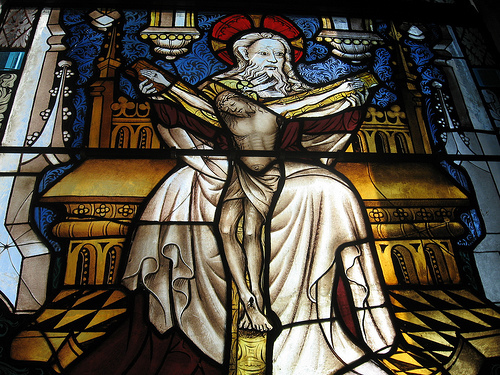We run our website the way we wished the whole internet worked: we provide high quality original content with no ads. We are funded solely by your direct support. Please consider supporting this project.

Was Jesus Abandoned by the Father on the Cross?
As Jesus hung on the cross, he cried, “Eli, Eli, lema sabachthani?” (Mt 27:46). This is the cry of our God who stooped to the furthest possible depths to experience his own antithesis, as the all-holy God becomes the sin of the world (2 Cor 5:21) and the perfectly united God becomes the curse of our separation from God (Gal 3:13).
Not surprisingly, this cry has always troubled theologians who were invested in preserving the classical understanding of God’s impassibility and immutability. How could God the Son truly experience abandonment from the Father if the Trinity is “above” suffering and “above” experiencing any kind of change? Hence, to insolate the divinity of Jesus from any suffering and change, the general way classical theologians have interpreted Jesus’ desperate cry was to argue that it arose out of his experience as a full human being, not his divinity. Among other problems, this interpretation calls into question the unity of the person of Jesus Christ and thus borders on Nestorianism. Not only this, but if God himself did not experience change and suffering on the cross, one is hard pressed to see how Jesus’ experience of change and suffering actually reveals God—let alone constitutes the quintessential revelation of God!
In more recent times a number of scholars have argued that Jesus was quoting the first line of Psalm 22. Since Psalm 22 ends on a note of hope in God’s redemption (vss. 22-31), some have suggested that Jesus’ apparent cry of despair might actually have been an expression of confidence that his abandonment was going to be temporary and that his Father would ultimately vindicate him.
But even if Jesus was alluding to the entire Psalm and was confident he would eventually be restored, this does not negate the truth that he was genuinely experiencing God-forsakenness and was, in his supremely tormented state, even experiencing confusion as to why it was happening.
It is not merely that Jesus experienced genuine God-forsakenness, he was in fact genuinely forsaken, as a number of theologians and NT scholars have emphasized in recent years. James Edwards, for example, says that on the cross, “Jesus is wholly forsaken and exposed to the horror of humanity’s sin.” This horror, he adds, is “so total that in his dying breath he senses his separation from God.”
At the same time, the unity of the Trinity could not be temporarily severed. If God’s eternal essence is the perfect loving unity of the Father, Son and Holy Spirit, then any suggestion that this perfect unity could be “severed,” even for a moment, would, by definition, entail that the Trinity could conceivably cease to exist. At the very least, if the “innermost life of the Trinity” could conceivably be threatened, the union of the three Persons must be understood to be a contingent, rather than a necessary, reality. And in this case, we cannot claim that God’s very essence is the loving union of the three Persons.
We can simultaneously affirm the ongoing, unbroken unity of the Trinity while also affirming the authenticity of Christ’s cry, on the other, if we simply remember that that this separation was entered into by all three divine Person’s out of love for human kind and for one another. As paradoxical as it sounds, the anguished separation of the Father and the Son on the cross constitutes the quintessential expression of the loving unity of the Father and the Son. Indeed, the unsurpassable cost of this divine separation expresses the unsurpassable perfection of the love of this divine union.
Perhaps the best way of thinking about this is to distinguish between the love and unity that the three divine persons experience, on the one hand, and the love and unity that defines God’s eternal essence, on the other. We could say that on the cross, the former was momentarily sacrificed as an expression of the latter. That is, the three divine Person’s sacrificed their previously uninterrupted experience of perfect love and union in order to express the perfect love and union that defines them as God.
Image by jlwelsh via Flickr.
Category: Q&A
Tags: Abandonment, Cross, Jesus, Love, Trinity
Topics: Atonement and The Cross
Related Reading

Why Didn’t Jesus Denounce Military Service?
A common objection to the claim that Jesus and the authors of the New Testament were opposed to all forms of violence is that neither Jesus nor anyone else speaks out against it. When soldiers asked John the Baptist what they should do in response to his message, for example, he told them not to…

Quotes to Chew On: Conflicting Depictions of God
“This is something like the way I believe we should respond when we encounter biblical narratives that depict God doing things we can’t imagine Christ doing. For example, I can’t for a moment imagine Jesus—the one who made refusing violence and loving enemies a condition for being considered a child of God—commanding anyone to mercilessly…

God’s Kind of Holy War
This is part three of a series on Revelation. You can find part one here and part two here. While there will come a day when the sacrificial victory of the Lamb and of his people will be apparent to all (5:13; 15:4; 21: 23-4), only to those who embrace the perspective of the heavenly…

Violence: What Did Jesus Do?
Thomas Quine via Compfight Here’s a spot-on reflection on what Jesus taught us about responding to violence. Whatever you think about the justification of violence in particular situations, as Christians we simply cannot escape the fact that Jesus demonstrated another way. From the reflection: And though he had access to unlimited power to have himself released…

Love That Keeps On Giving
In English, we have one word for love. In ancient Greek, there were four different words that we can translate as “love.” And each has a different meaning. Let’s consider each briefly. Storge—referred to a person’s affection for something. When we say we love our car or a person’s smile or another’s ability to sing,…

The Gift of Smallness
ram reddy via Compfight Jonathan Martin wrote this piece entitled Feeling at home in my smallness a couple of weeks ago. If you’ve been feeling like the weight of the world is on your shoulders and it’s up to you to do something amazing or if you’ve been taking yourself a little too seriously, you…
